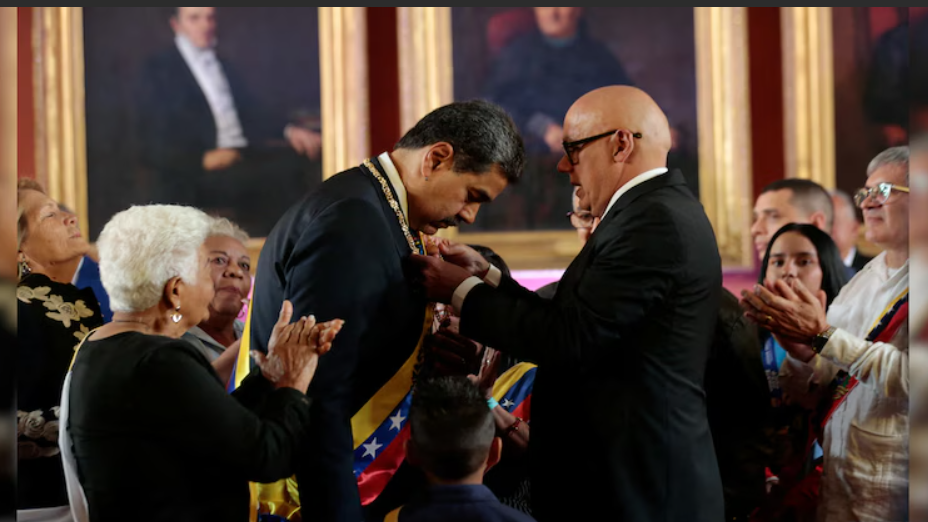Maduro Sworn in for Third Term Amid Rising Tensions and Increased US Bounty
Social Issues Social Inequalities and exclusionPosted by NewAdmin on 2025-01-16 12:53:30 |
Share: Facebook | Twitter | Whatsapp | Linkedin Visits: 80

Venezuelan President Nicolás Maduro, who has been in office since 2013, was sworn in for his third term on Friday, despite ongoing disputes over the July election, international pressure for him to step down, and an increased US bounty for his capture. Maduro was declared the winner of the July election by Venezuela's electoral authority and the top court, although detailed vote counts confirming his victory have not been made public. In contrast, the Venezuelan opposition, backed by several countries including the United States, claims that the election results were rigged and that their candidate, Edmundo Gonzalez, won in a landslide. International election observers also criticized the vote as undemocratic.
The months following the election have been marked by political turmoil, including Gonzalez's flight to Spain, the hiding of his ally Maria Corina Machado, and the detention of several opposition figures and protesters. In a major move, the Biden administration raised its reward for information leading to Maduro's arrest or conviction on drug trafficking charges to $25 million, up from the previous $15 million. The US also issued rewards for Interior Minister Diosdado Cabello ($25 million) and Defense Minister Vladimir Padrino ($15 million), and imposed new sanctions on eight other officials, including the head of Venezuela's state oil company PDVSA, Hector Obregon. Maduro and his allies have consistently rejected the US accusations, labeling them as part of an "economic war" aimed at crippling the country.
The US sanctions were accompanied by similar measures from Britain, the European Union, and Canada, each targeting a number of Venezuelan officials. Despite these external pressures, Maduro remains defiant, claiming the country’s resilience against the sanctions and attributing some economic hardships to these measures. In his inauguration speech, Maduro mocked the US, stating that the outgoing administration doesn’t know "how to take revenge on us."
As tensions mount, opposition figures like Gonzalez and Machado are expected to speak out later, with Gonzalez vowing to return to Venezuela to assume the presidency, though without providing further details. The Venezuelan government has warned that Gonzalez would be arrested upon his return, offering a $100,000 reward for information leading to his capture. Meanwhile, Machado, who was briefly detained after an anti-government march in Caracas, was reportedly forced to film videos while being held, a situation the government denied any involvement in.
Maduro's third-term inauguration, held at the National Assembly in Caracas, was attended by 2,000 guests, including key allies such as Cuba’s President Miguel Díaz-Canel and Nicaragua’s President Daniel Ortega, as well as Russian officials. Despite claims of the country’s economic growth, Venezuela continues to face severe economic challenges, with triple-digit inflation and an exodus of over 7 million migrants. As protests continue, the Venezuelan government has released over 1,500 people detained during recent demonstrations.
Search
Categories
Recent News
- Drug Bust Uncovers Medical Students' Ganja Network
- Drug Scandal Shocks Telangana's Medical Community
- Bihar's Medical Marvel: 10kg Tumour Extraction Saves a Life
- Adobe's Firefly: Unlocking Creative AI for Paid Users
- Defence Giant HAL's Shares Plummet Amidst Fighter Jet Competition
- Apollo Tyres Gears Up for India's Cricket Journey
- Drug Scandal: BRS Leader's Kin Questioned, Released
- Dreamliner Radar Glitch Grounds Delhi-Bound Flight